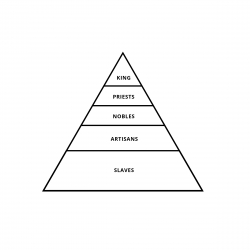This article brought to you by the years 5000 to 2000 BCE!
Welcome back to the land that lies between two rivers: Mesopotamia! The land is very fertile here. The people have plenty of food so they have lots of time to create new things. Wheels! Writing! Farming! Religion! For starting so far in the past, life is pretty sweet here. So, are you happy to be here? Are you excited to try all of the foods and explore the ziggurats and see everything the land between two rivers has to offer? Well, not so fast . . . If you live in Mesopotamia in the past, what you are allowed to do depends on who your parents were.
These days we have rich people and we have poor people. We have presidents and we have priests. But the promise of the United States is that no matter where you are born in the country, you can work hard and become anything you want to be -- even president. Just think what life would be like if your country did not have that promise. You would be stuck where you were born and could never grow richer (or poorer) than your parents. A hierarchy is the order in which people are placed in society that determines the power people have. Kings are at the top. The poor are at the bottom. In Mesopotamia it was understood that wherever a person began their life, that is where they would stay until they died.

Mesopotamians lived in one of five classes. A
social class is a group of people who have similar amounts of power and money because of their job or birth. At the bottom of all the classes were the slaves, who were given only the hardest work, like carrying the great clay bricks to build the temples or being killed to please the gods. The king got to live in comfort while making laws, wearing gold, and leading the army. After the king came the priests, who were important because they could talk to the gods. The priests spent most of their time in the temples. So what were the others up to?

This standing figure, with clasped hands and a wide-eyed gaze, is a worshiper. It was placed in the "Square Temple" at Tell Asmar, perhaps dedicated to the god Abu, in order to pray perpetually on behalf of the person it represented.
Rosemaniakos from Bejing (hometown), CC BY-SA 2.0 , via Wikimedia Commons
What would you want to be if you were born at this time? I will tell you that I would want to be a king! But you could not choose that for yourself. Today, you cannot choose who your parents are (so if they embarrass you, you are stuck with them). In the same way, people in ancient Mesopotamia could not choose the class they were born into. Let's say you got very lucky. Not so lucky as to be the king, but lucky enough that you were born to a family with money. A
noble is a person who is born into a rich and powerful class. There was also a class of priests, who were well respected because they healed people and spoke to the gods. There was also a class of artisans, who built things by hand, and merchants, who sold things. All of these classes lived pretty good lives.

Mesopotamian Lion, reconstruction of the original in Berlin, Germany.
Photo by: Andy Hay
Sadly, the odds of your being born into one of the above classes were very slim. Most people in the land between two rivers were very poor, in the peasant class. A
peasant was a poor farmer who works the land. They did not get to go to school. They did not get to go out and see the great temples or cities around land. They mostly farmed all day. Some people in this class would fish or make pottery, but most of them were stuck on the farm, day in, day out, until the day they died. Lucky for them, Mesopotamia did very well for itself, so they did have their own homes, and they were comfortable for the most part.

An example of an artisan at work
Victoria and Albert Museum, Public domain, via Wikimedia Commons
Just because you live in the land between two rivers does not mean your life is going to be great. The people lived in a hierarchy, or an order of people from top to bottom. There were about five social classes. At the very top was the king. Then came the nobles, or people born to rich families. Below them were the peasants, the people who farmed the land for the king. The land was rich enough and comfortable for a people who had to work all day every day. At the very bottom of the hierarchy were the slaves, who did all of the hard work, like irrigation or building temples with heavy stones or being sacrificed. Even the most enlightened societies still have its people who live at the bottom.
References:
Ancient History Encyclopedia. "Mesopotamia." ancient.eu, 2009. <http://www.ancient.eu/Mesopotamia/>